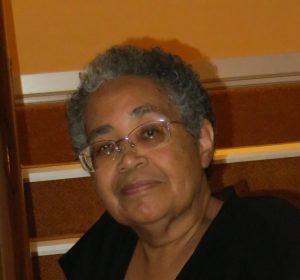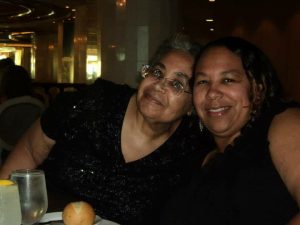Published on October 23, 2018
Vitamin D has helped me to walk, to sleep, to get off medication
Tell us a little about yourself.
 My name is Zuleika Jamal. I am a 63-year-old woman living in the Metro DC area. I’m originally from Boston and most of my family still lives in the Metro Boston area. I moved from Boston to Maryland solely due to the severity of my seasonal affective disorder (SAD) symptoms as a result of the Boston winters.
My name is Zuleika Jamal. I am a 63-year-old woman living in the Metro DC area. I’m originally from Boston and most of my family still lives in the Metro Boston area. I moved from Boston to Maryland solely due to the severity of my seasonal affective disorder (SAD) symptoms as a result of the Boston winters.
How did you hear about GrassrootsHealth & vitamin D?
I heard about vitamin D approximately 12 years ago, way before vitamin D was commonly known or discussed in association with SAD. I saw an interview with Dr. Holick in a magazine. After that article, I started researching vitamin D on the Internet and in Pub Med. Years later I heard about the GrassrootsHealth Breast Cancer Prevention Project from Dr. Cannell of the Vitamin D Council.
Why are you part of the Breast Cancer Prevention Project?
After many years of research and personal use of vitamin D, I strongly believe in the preventive and curative powers of vitamin D for cancer and other health problems
How was your health before using vitamin D?
I am obese. I am still obese, though I will lose weight in the summer and gain again during the winter. I have SAD and arthritis. Four years ago I had my right knee replaced. For many years I had osteopenia. There was a period of time when I could not walk without severe pain, could not sleep the entire night due to pain, could not lift my legs to step up a curb without support or roll over in bed without pain.
Vitamin D has cured my osteopenia, alleviated arthritis and SAD symptoms, given me my mobility and strength back, and greatly relieved or eliminated muscle and bone pain.
How much vitamin D do you take? How do you get it (sun or supplements)?
I love the sun. I have always loved the sun. But due to obesity, I tend to stay indoors as I age so I get most of my vitamin D from supplements. I generally take 50,000 IU/week during the summer and 100,000 IU/week during the winter, though I will take up to 50,000 IU/day if I feel under the weather or if the flu is going around. I haven’t had the flu since I’ve started taking vitamin D.
What is your vitamin D level? How often do you test? Any tips or stories?
My vitamin D level is 135 ng/ml (337 nmol/L). My vitamin D level has been tested three times a year for about 10 years now. It’s tested twice a year by GrassrootsHealth and once a year by my primary care physician. My primary care physician also monitors my calcium levels to make sure my “high” vitamin D level does not make me hypercalcemic. I have found that as long as I also take K2 with my D, my calcium levels remain in range. The first time my physician tested my D levels and found them “high” he even ordered an ultrasound of my organs. But, we have never found a problem so now we have settled into a pattern. Test vitamin D and calcium, read measurements, receive the token warning at the end of every visit, “Your levels are …, which is out of range. It is not recommended to take vitamin D at the dose you’re using.”
I don’t really worry about my vitamin D levels. I have had vitamin D levels as low as 50 ng/ml (125 nmol/L)…not for many years now…and as high as 300 ng/ml (750 nmol/L). I would prefer to keep my vitamin D levels anywhere between 120 and 130 ng/ml (300-325 nmol/L) and have reduced the daily high doses and weekly injections of D I used to take in an attempt to keep my levels in that range. I consider a D level between 85-135 ng/ml to be acceptable (210-340 nmol/L).
Do you believe vitamin D helps fight breast cancer? If yes, what convinced you? What do you tell other women about vitamin D?
 I definitely believe vitamin D helps fight breast cancer. I have done extensive research, some of my favorite studies have been an article where adequate levels of vitamin D turned off breast cancer genes (see references 1 & 2 below); a rumor/story of a woman with breast cancer injecting vitamin D and having the mass shrink and disappear; one of my friends with breast cancer took 100,000 IU/day a month before surgery and the tumor shrunk and became encapsulated.
I definitely believe vitamin D helps fight breast cancer. I have done extensive research, some of my favorite studies have been an article where adequate levels of vitamin D turned off breast cancer genes (see references 1 & 2 below); a rumor/story of a woman with breast cancer injecting vitamin D and having the mass shrink and disappear; one of my friends with breast cancer took 100,000 IU/day a month before surgery and the tumor shrunk and became encapsulated.
I tell other women to please, please, please get their vitamin D levels tested, to take enough vitamin D, and to keep their vitamin D levels above 85 ng/ml (210 nmol/L), especially if they have a family history of cancer.
Do you have any specific information on vitamin D you’d like to offer?
Probably enough information to fill a couple of books, lol.
But I’d really like to address two specific items.
The First, People of Color
For people of color, like me, and especially people of Islamic and Jewish faiths, it is especially important that they get their vitamin D levels tested and supplement with vitamin D as having darker skin takes longer to make vitamin D from the sun than people with light skin and people of Islamic and Jewish faiths generally do not wear skin-baring clothing which reduces the amount of skin exposed to the sun and the amount of vitamin D that may be generated from the sun. These populations have a very high incidence of vitamin D deficiency. (See references 3,4,5)
Secondly, Pregnancy, Infertility, Childhood Development
The other area I am passionate about is how essential vitamin D is to the health and development of a fetus and infant. I give a copy of Bruce Hollis and Carol Wagner’s paper (ref. 7) to anyone I know that’s pregnant or trying to get pregnant. Of course, the information has since been updated (References 6, 7, 8, 9, 10 or go to GrassrootsHealth Protect our Children NOW!).
I am on top of this issue because of all the research that it helps people get pregnant; makes a healthier baby and easier delivery; protects your baby from autism and type I diabetes. Vitamin D can literally change your child’s life if you start in utero.
What would you recommend to others who are in a similar situation?
Take vitamin D. Take a lot of vitamin D. Take a lot of vitamin D for a least three months – give it a chance to work. I believe vitamin D is truly a miracle.
I wish I had known of the great benefits of vitamin D when I was starting a lot younger. Which is one of the many reasons I feel called to pass on my knowledge of vitamin D.
References
1Vitamin D holds promise in battling a deadly breast cancer
Science News
January 2013
Read Article
2The Vitamin D Receptor: New Paradigms for the Regulation of Gene Expression by 1,25-Dihydroxyvitamin D3
Endocrinology Metabolism Clinics of North American
J. Wesley Pike and Mark B. Meyer
June 2010
Read Paper
3Vitamin D and African Americans
The Journal of Nutrition
Susan S. Harris
April 2006
Read Paper
4Ultra-Orthodox Jewish women at risk of vitamin D deficiency
BMJ Clinical Research
Judy Siegel-Itzkovich
July 2001
Read Paper
5Muslim Women Have Low Vitamin D Levels
Medica Magazine
Read Article
6Assessment of dietary vitamin D requirements during pregnancy and lactation
The American Journal of Clinical Nutrition
Bruce W. Hollis and Carol L. Wagner
May 2004
Read Paper
7Vitamin D supplementation during pregnancy: Improvements in birth outcomes and complications through direct genomic alteration
Molecular and Cellular Endocrinology
Bruce W. Hollis and Carol L. Wagner
September 2017
Read Paper
8Role of vitamin D in infertility
Journal of Public Health Policy and Planning
Hawaldar Ranjana
August 2017
Read Paper
9Vitamin D in Children’s Health
Children
Joy A. Weydert
September 2014
Read Paper
10Vitamin D treatment during pregnancy prevents autism-related phenotypes in a mouse model of maternal immune activation
Molecular Autism
Sephanie Vuillermot et al.
March 2017
Read Paper

